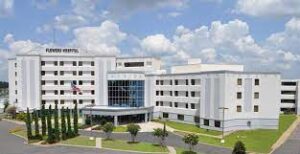When the COVID-19 virus spread across the country three years ago, dozens of state legislatures approved statutes that granted health care providers immunity from legal actions brought by people who claimed to have been injured by COVID treatments.
“Absent wanton, reckless, willful, or intentional misconduct, a health care provider is not liable for any damages, injury, or death alleged to have been caused by an act or omission of the health care provider during the performance or provision of health care services or treatment that resulted from, was negatively affected by, was negatively impacted by a lack of resources caused by, or was done in response to the Coronavirus pandemic or the state’s response to the pandemic,” reads a section of Alabama’s two-part law, adopted in 2021.
That immunity also applies to lawsuits brought by patients who were hurt in slips and falls at the hospital, even if the injury was not directly related to virus treatments, the Alabama Supreme Court decided Jan. 26.
“The plain language of §§ 6-5-791(a)(13) and 6-5-792(a) mandate Triad’s entitlement to immunity as to the Askews’ negligence claims,” Justice William Sellers wrote for the court in a case brought by Voncille and Don Askew against Triad of Alabama, doing business as Flowers Hospital.

Voncille Askew was diagnosed with COVID-19 in September 2021 and her physician scheduled her for monoclonal-antibody infusion therapy, an accepted treatment for COVID, at Flowers Hospital in Dothan, Alabama, the court explained. After two hours of therapy, the Askews exited, as directed by the hospital staff, through the “infusion entry” at the building. Voncille’s foot caught the edge of a concrete ramp, causing her to fall and sustain serious injuries.
Eight months later, the Askews filed suit against the hospital, claiming negligence for an unsafe entryway. Triad argued that the Alabama COVID-19 Immunity Act grants the hospital safe harbor from legal actions. The Houston County Circuit Court sided with the plaintiffs, though, and struck the hospital’s immunity defense.
Triad appealed. The Supreme Court agreed with Triad last week and blocked the lower court’s striking of the hospital’s immunity defense, noting that the wording of the immunity statute appears to cover all claims related to the coronavirus, even those not directly related to medical treatments.
The Askews’ attorney had argued that the injury claim from the fall at the entryway bore “striking dissimilarity” to the types of claims described in the immunity law. But the justices disagreed, pointing out that the court had already granted immunity to a state agency on similar grounds in 2022.
“The statute imposes no limitations on the chain of causation or on the relation between a claim and Coronavirus outside of those limitations inherent to the words ‘arises from’ or ‘is related to,'” the opinion reads.
The Supreme Court directed the trial court to to vacate its order that barred the immunity defense. The opinion can be seen here. Connor Wilson Herfurth, of the Balch & Bingham law firm, represented the hospital in the appeal. The hospital’s insurance carrier was not named in the opinion.
Was this article valuable?
Here are more articles you may enjoy.

 FM Using AI to Elevate Claims to Deliver More Than Just Cost Savings
FM Using AI to Elevate Claims to Deliver More Than Just Cost Savings  Charges Dropped Against ‘Poster Boy’ Contractor Accused of Insurance Fraud
Charges Dropped Against ‘Poster Boy’ Contractor Accused of Insurance Fraud  Credit Suisse Nazi Probe Reveals Fresh SS Ties, Senator Says
Credit Suisse Nazi Probe Reveals Fresh SS Ties, Senator Says  China Bans Hidden Car Door Handles in World-First Safety Policy
China Bans Hidden Car Door Handles in World-First Safety Policy 